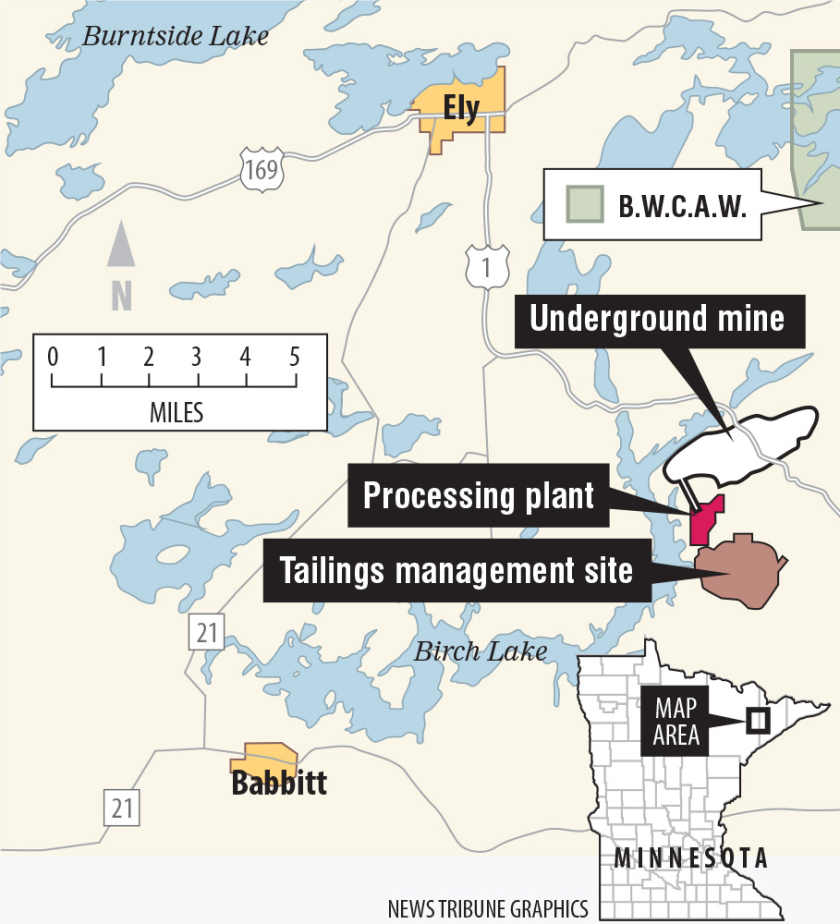WASHINGTON — A federal judge has dismissed a lawsuit Twin Metals filed last year against the Biden administration over its decision to cancel the company’s mineral leases for its planned copper-nickel mine near the Boundary Waters Canoe Area Wilderness.
Judge Christopher Cooper of the U.S. District Court in Washington on Wednesday, Sept. 6, granted a motion by two federal agencies and a coalition of environmental groups and recreational businesses to dismiss Twin Metals’ claims. The decision can be appealed, according to the order.
ADVERTISEMENT
In a 21-page decision, Cooper said the court found it lacked jurisdiction on two of the company’s claims “and that the remaining two fail to state a claim.”
the U.S. Department of Interior and Bureau of Land Management, was "arbitrary, capricious, and unlawful evisceration" of the company's mineral rights.
Although Twin Metals actions by the Biden administration have dealt major setbacks to the project.
"Twin Metals Minnesota is disappointed by the opinion issued today regarding a lawsuit the company brought in U.S. District Court on Aug. 22, 2022, and we are working to determine next steps. We remain committed to the communities of northeast Minnesota — as we have been for more than a decade — and to supplying the minerals required for the energy transition," Twin Metals spokesperson Kathy Graul said in an email to the News Tribune.
Environmental groups celebrated the judge's decision.
“This is a great day for the Boundary Waters,” Ingrid Lyons, executive director of the Campaign to Save the Boundary Waters, said in a statement. “Twin Metals tried to force renewal of terminated federal mining leases next to the Boundary Waters Canoe Area Wilderness. The United States government followed the rule of law and moved to dismiss this unlawful lawsuit. We are one step closer to permanent protection for the Boundary Waters watershed.”
A spokesperson from the Department of Interior declined to comment Wednesday and the Bureau of Land Management did not immediately respond to the News Tribune’s request for comment.
ADVERTISEMENT
The company, owned by Chilean mining conglomerate Antofagasta, is hoping to build a large underground copper-nickel mine and dry-stacked tailings storage facility near Ely and Birch Lake, within the Rainy River Watershed and 5 miles from the BWCAW. Critics say the project could send tainted runoff into the BWCAW, while supporters say the mine would bring much-needed jobs to the region.

The leases, first issued in 1966, over concern the mine would pollute the BWCAW if it were ever to open in the same watershed. The and The 10-year leases were then
But in January 2022, Ann Marie Bledsoe Downes, acting deputy solicitor of Indian affairs for the Department of Interior, wrote in that the 2019 lease renewal by the Trump administration violated Bureau of Land Management regulations and that the agency prepared an "inadequate (National Environmental Policy Act) analysis of the renewal decision."
Earlier this year, the Biden administration also
Similar to not renewing the leases, the mineral withdrawal had been started by the Obama administration, was later reversed by the Trump administration and then brought back by the Biden administration.
found that hardrock mining in the Rainy River Watershed would pose an environmental risk to the BWCAW.
“Twin Metals was making a Hail Mary pass in its hope to get around the law and facts. The court saw through this and in its decision to toss out the case, affirmed science, affirmed the law, and protected some of the cleanest water in the country,” said Chris Knopf, executive director of Friends of the Boundary Waters Wilderness. “Despite this resounding victory, in the conservation world, it’s often said that every victory is temporary and every defeat is permanent — we will remain vigilant in protecting the Boundary Waters.”
ADVERTISEMENT









